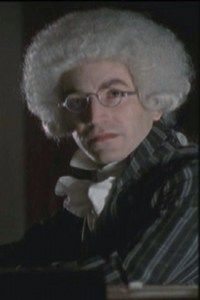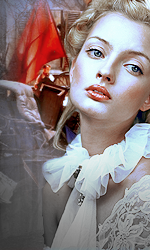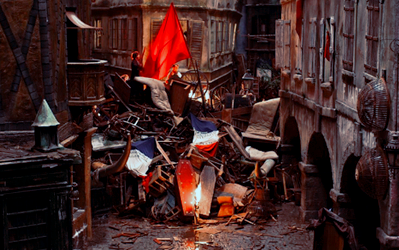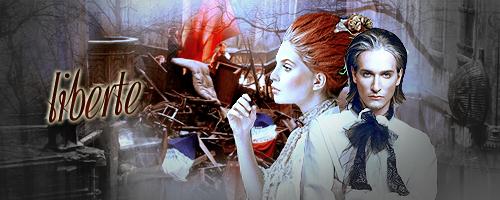Post by Deleted on Jun 21, 2013 12:30:07 GMT -5
| [atrb=cellSpacing,0,true][atrb=border,0,true][atrb=style, width: 460px; background-image: url(http://i44.tinypic.com/34fb0ns.jpg);-moz-border-radius: 0px 0px 0px 0px; -webkit-border-radius: 0px 0px 0px 0px; border: 4px ridge #7a9aa9, bTable][tr][cs=2] Maximilien de Robespierre. 35. French Citizen. Ronon Vibert. | |
[rs=2] | I have so many times put pen to paper to advance causes great and small, but as I do so on this summer night, on the eve of my most momentous undertaking, I find my mind wandering backward. How did all of this happen? How did the meticulous -- and, to be honest, somewhat finicky -- Maximilien François Marie Isidore de Robespierre find himself in tattered homespun in a cramped garrett in one of the poorest quarters of Paris? How did a provincial lawyer come to be the hope and savior of the downtrodden of this great city -- indeed, of all of this great nation? Best, I think, to begin at the beginning. I was born in Arras, the first of four children, four months after my parents married. They were deeply attached to each other, and she bore child after child on an almost yearly basis, until the fifth one proved to much and she died shortly after it was itself stillborn. I was scarcely six at the time, but I remember it vividly. It was a severe shock to me at such a tender age, but it seemed even more so to my father. Devastated by the loss of her, he fled first into drink and gambling, and later abandoned us entirely. My sisters, Marie-Marguerite and Henriette-Eulalie, were taken in by our aunts, and my brother Augustin and I by our maternal grandfather. I've always been extremely intelligent, even as a child. I say that not as a boast, but as simple fact. I might have been poor in wealth, but I was rich in mind, and my grandfather stinted nothing in my education. Small and slight, I didn't waste my time on the crude roughhousing and sports that distracted so many boys my age -- I exercised and perfected my mind. And I benefited greatly from such diligence, earning a scholarship to the College of Louis-le-Grand in Paris when I was 12. That was in the time of the Corsican who, despite being a militarist and a tyrant, I grant did encourage education. Even after his overthrow a scant two years later and during the subsequent violence and unrest that followed, that institution of learning persevered. I remember my time at the College with great fondness. I'd gone with some trepidation, half-expecting to find myself among more of the bullies, bruisers, and brutes that dominated the young of Arras. I arrived a quiet and reserved child. perhaps a bit melancholy, but was welcomed warmly by other boys much more of my sort. Quickly becoming friends, we read and studied together, sometimes staying up till dawn, talking and arguing. When we grew a little older, we grew also into the other passions an interests of men, but though we enjoyed our wine and our occasional dalliances with the ladies, we never let our wits be completely overthrown (at least not for long) and we remained steadfast companions. It was there I met Freron, Dupont-Dutertre, and Suleau. And of course Camille Desmoulins. I wonder sometimes if they had any premonition, as I did, of the glory and tragedy that were both so soon to befall us. I excelled in the College, always at or near the top of my class. I mastered the classical languages of Latin and Greek, as well as history, rhetoric, science, indeed far too many subjects to list. When I graduated 12 years later, I was awarded a bonus of 600 francs for my outstanding scholarship. It was Rousseau, though, who was the creates treasure I'd received there. He had been dead for over a century, but his words still rang with recondite truth so clear and brilliant that it took my breath away. I had always known the world was not as it should be, it was Rousseau who articulated what we could -- what we must -- become. I returned to Arras a qualified lawyer in my twenty third year, as peace was finally taking hold. Passing on my scholarship to Augustin, I set up a practice there, and soon settled into a comfortable routine. (I confess I can be absent minded at times, and I find great ease in maintaining regular habits.) I was reunited with my sisters, and joined the Rosati, a society of learned men of high and fine sensibility, poets all, whatever our workaday careers. And, to speak with the delicacy due such matters, I remained quite popular with the members of the fairer sex, whose company I greatly enjoyed in return. This is not to say that I came to be on good terms with everyone. Indeed, what lawyer can be? The finer the lawyer, the more enemies he shall make, and I was and am, in all modesty, a very fine lawyer. There were those who scorned me for my parents' lack of marital blessing at the time of my conception, or for my relative penury, or for my father's fecklessness -- though indeed I made shift to pay the debts he had incurred as swiftly as I was able. Most of those who held me in such opprobrium, however, were knaves and villains, men who felt themselves free to oppress and abuse those weaker in wealth or social rank. I am no bladesman, I detest such crude physical conflict, but with the sword of the law in my hands, I am among the finest duelists who ever lived, and they hated and feared me for coming so ably to the defense of their victims. It was this unswerving dedication to justice for the common man, I am sure, that led to my election as a deputy to the Assembly. Doubtless some of the ballots which were cast for me were merely with the intent of getting me out of town, but whatever the motive behind them, I welcomed the opportunity. Paris was where the future lay, where I could help not just the downtrodden of Arras, but all of France, by reforming government and even society itself into an ideal construct based on liberal and egalitarian principles. The people soon saw that passion in I had such great dreams then, and I was as passionate about them as I am now, but I was young and foolish and naive. We all were. I was reunited with my friends from Louis-le-Grand, and met so many more educated and high-minded individuals dedicated to the same cause. We formed the Jacobin Club and set about building what we thought was a shining city on a hill, but proved to be just a castle on a cloud. Determined to avoid the mistakes of the past, we blinded ourselves to its power, and to the fact we were still living in the same world, amid the same imperfect humanity. We thought we were already living in that brave new future, with no need of the old ways of doing things -- soldiers, spying on our own people, torture, capital punishment, all of those things would twist and taint the grand experiment. We never expected the Chouannerie. Chauvelin tried to warn us, but we thought he was just too old, too steeped in the dark and murderous methods of the past to see the brilliant path that lay ahead. We laughed him off. Worse, we rebuked and repudiated him, and to my shame I led that charge. And yet when that Night of Blood came, when the the Guard turned their muskets on us and the slaughter began, when I was being hunted like a wounded animal, it was he who got me to safety and hid me. Though I saw little of him thereafter, I know he was the source of the monies that came to provide for my food and lodging, and the publishing of the pamphlets I wrote in the intervening years to educate and inspire the people of this great city. I'm an unlikely revolutionary leader. My eyes are weak, requiring spectacles. I'm not a big or strong man physically, and the thought of striking someone fills me with revulsion. Though I've long since shed my Picard accent, my voice is soft, lacking the booming, majestic oratory of Mirabeau or Danton. But I have a gift for words, I can speak to people, to bring them understanding not just of the injustice of their suffering, but that they have the power to do something about it. And soon they will. Soon, with me at their head, they will rise up, and there will be a reckoning such as this city, this nation, has never before seen. Notes: I wasn't sure when he fathered Claudette or with whom, so I put in some vague opportunities. RP Sample: Please see Chauv or Sylvie. |
CC. 46. been here awhile now |



